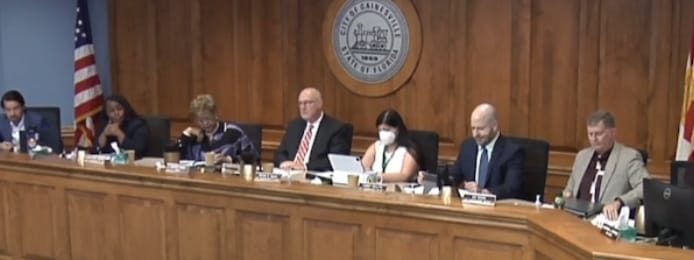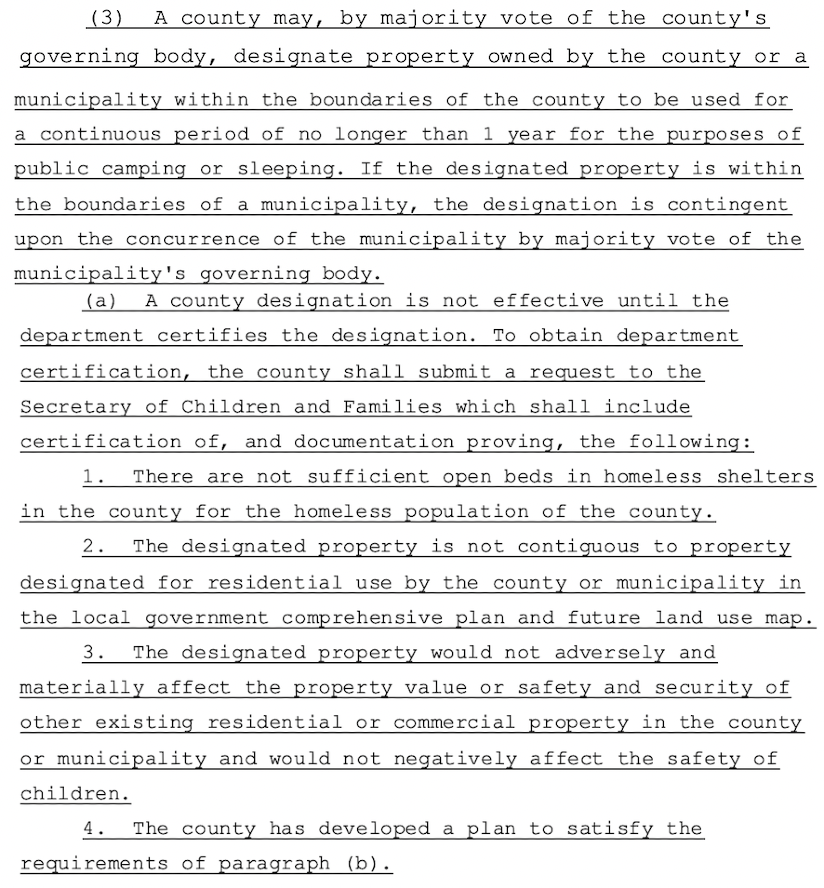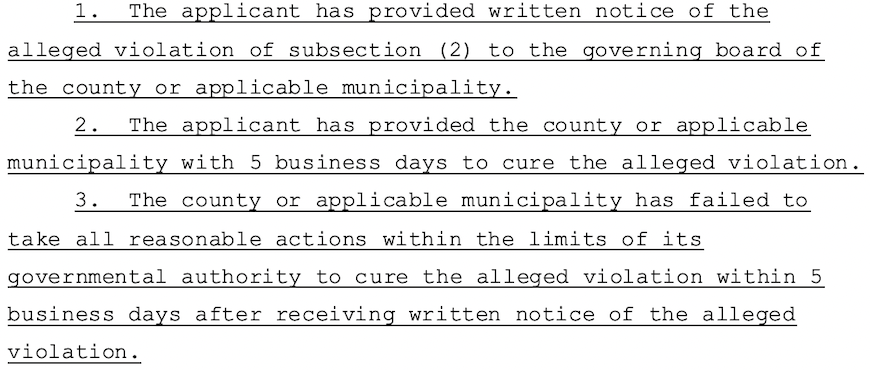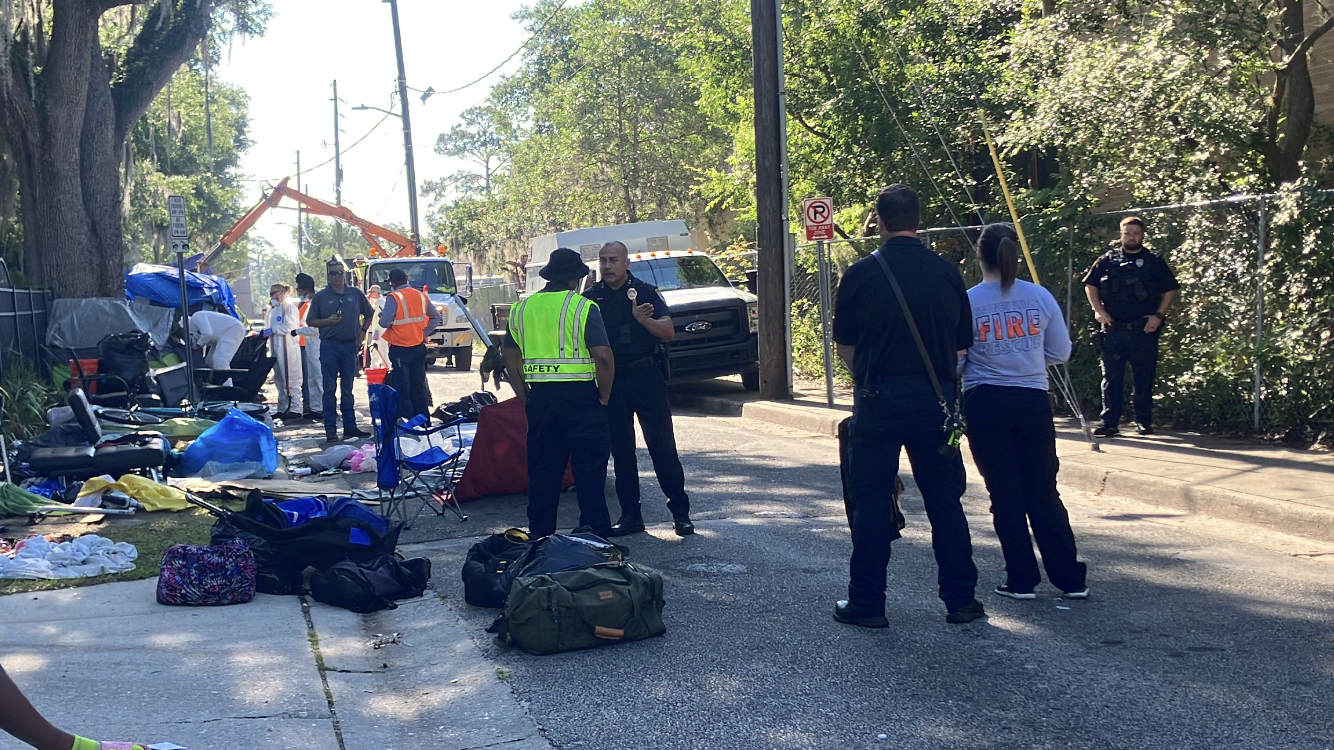City of Gainesville Affirms Ordinance Banning Sidewalk Sleeping

Gainesville City Commissioners approved the ordinance 6-1 on its second reading and will receive information on citation and arrest data relating to the ordinance at Gainesville Police Department Quarterly Updates.
Last week, the City of Gainesville held a second reading on their ordinance that prohibits citizens from camping in public spaces like sidewalks and public parks.
The ordinance comes amidst the passing of Florida House Bill 1365, which bans public camping statewide.
House Bill 1365 went into effect on October 1, but the bill states its items may not be applied until January 1.

The bill states that a municipality would be allowed to designate a piece of public property for public camping for up to one year if there aren’t sufficient beds in homeless shelters and under the condition it would not intersect with residential usage or interfere with property values.

Under the law citizens and businesses may sue the City of Gainesville for encountering a homeless person camping on public property if “The applicant has provided the county or applicable municipality with 5 business days to cure the alleged violation” and “The county or applicable municipality has failed to take all reasonable actions within the limits of its governmental authority to cure the alleged violation within 5 business days after receiving written notice of the alleged violation.”

Commissioner Reina Saco asked City Attorney Daniel Nee to confirm that the fine issued for public sleeping would be civil and not criminal.
Nee responded “That is correct…. Partially correct. This chapter can be enforced as most violations in our ordinances; one of two ways. Either through civil citations or municipal ordinance violations…. it allows for the arrest of a person if necessary.”
Nee said citations would be the method generally used by law enforcement.
Saco asked if criminal enforcement would be a last option, stating, “Our folks are more empathetic and better trained than to start with the arrest.”
Nee responded, “That is the practice. For this ordinance, the idea is to keep the public property and public right of way free of camping.”
Saco said, “We've had some emails thinking it’s criminalizing; we are not attempting to do that. That is not what we want to do, but we have little choice.”
Clip from the Dec 5 Gainesville City Commission meeting
Mayor Harvey Ward said the City of Gainesville had recently allocated $2.05 million to homeless services and an additional $1.0 million for affordable housing development.
Ward said, “There’s a long way to go with affordable housing. I would suggest that what many of you are here to talk about doesn’t even relate to housing so much as it relates to mental health services and addiction support services. Those are things that are frankly outside the budget of the City of Gainesville…. Speak to your legislators because that is where the money is.”
During public comment, University of Florida (UF) student Joyce Devins urged the city to not pass the ordinance. She said, “What this law is doing is criminalizing…. Simply changing the word ‘punishment’ to ‘penalty” does not negate the fact that a civil fine is a punishment for people already in poverty.”
Kimber Tuff of Southern Legal Counsel informed the City Commissioners they received a letter relating to their homelessness initiatives.
The letter by Southern Legal counsel argues the city is not legally required to pass the ordinance against public camping in response to House Bill 1365 and argues the ordinance is both costly and ineffective.
Numerous public commenters condemned the city for enforcing sweeps on local homeless encampments.
Gainesville Public Works, Gainesville Fire Rescue (GFR), and the Gainesville Police Department (GPD) have been clearing out local homeless encampments since May.
On May 9, the City of Gainesville announced they were closing Haisley Lynch Park for a “refurbishment and refresh” and forced all homeless people sleeping in the area to vacate. GPD arrested one woman at the sweep for not moving her stuff.
On May 16, GPD, GFR, and public works cleared out the tent encampment along Southeast 4th Place. City workers used a crane to destroy homeless resident’s property. One of the public works employees told unhoused advocates, “You failed them; you should’ve came earlier.” No arrests were made at this sweep.
A Gainesville city worker says "It look good, don't it?" as she loads up homeless resident's belongings into the back of a city vehicle. (May 16 2024) (vid cred. gnvinfo)

On September 16, another sweep occurred by the Dignity Village area near Grace Marketplace. GPD Captain Victoria Young stated at the last GPD quarterly update. "We are continuously working with the area that was formally Dignity Village and within Grace MarketPlace…. We work with Grace MarketPlace and got a list of their most violent offenders that they identified for us. They said that they were prolific offenders; they were the reason why a lot of people were not utilizing services there because they were afraid. We have been doing regular checks of that vacant area…. Within Grace MarketPlace, we made several arrests of those individuals and other individuals who've been trespassed and/or committed other crimes."
Commissioner Reina Saco said, “I hate that I have to vote for it today because my job is to look at the collective of Gainesville, and that does include people who are forced to sweep on the sidewalk for whatever reason…. In our [new Downtown Ambassador program], 9 of 14 [hirees] had previously experienced homelessness…. We can put our resources and our funding there, or we can put it towards lawyers when a business or individual sues us because they walked by and saw someone be homeless.”
Saco went on to say, “This is not criminal. It may lead to criminal prosecution if there is a series of choices made. I know I’m hilarious. There may be criminal prosecution that happens after a series of choices are made. That is after a long series of choices. What we’re trying to do is put out something that shields the city, you, and our tax dollars from a performative lawsuit on January 1.”
Clip from the Dec 5 Gainesville City Commission meeting
Commissioner Desmond Duncan-Walker said, “This puts us back into the cycle of arrest, debt, and living on the street…. While we’ve expended many resources, the saddest thing is that we don’t have enough. It’s hard for me to consider the trauma our homeless neighbors are already facing, and it’s hard to consider any further trauma…. Something like this is a hotbed for future conflict between law enforcement and the homeless…. I’m not going to vote for this ordinance.”
Commissioner Casey Willits said the Downtown Ambassador program is the city “using discretion to make sure the first person our homeless neighbors experience is not someone with a badge and a gun.” Willits suggested the city receive updates on data relating to the ordinance, such as the number of individuals fined.
Duncan-Walker said she agreed with Willits and that the City Manager’s Office should produce a report on the ordinance’s effects relating to fines and arrests.
Mayor Harvey Ward said they can implement a reporting mechanism through the GPD quarterly update. The next GPD quarterly update is slated to occur in January and will cover October-December 2024. GPD quarterly updates occur every three months and rarely receive public comment.
Ward stated there will be “about eight different levels of ‘Can you please move?’ before a citation gets issued." Ward said, "I don’t think any officer wants to spend half their shift writing a citation, cause that’s what that ends up being. I don't anticipate there being a large number of those. It is always frustrating to me when we have a conversation and use the word ‘homelessness’ when we’re actually talking about, if we’re being honest is chronic homelessness…. We’ll be having much more conversation about chronic homelessness this fiscal year because we are in the process—we will be in the process of renegotiating our shelter agreements. We are in an additional year six in a five-year contract with Grace right now…. What we are doing today is a mechanical piece that allows us to be in compliance with a state statute…. We’re not going to be sued because we’re going to implement the mechanics that allow us to be in compliance.”
Commissioner Cynthia Chestnut urged Gainesville residents to attend a delegation hearing with Gainesville’s legislative delegation on January 9. Chestnut said, “I don’t have the place where it’s going to be held, but there you will be able to present information to our delegation, and hopefully they’ll take that back to Tallahassee.”
Ward said Gainesville’s legislative delegation will be “widely publicized through the media.”
Ward said he’s talked to Republican Florida House Representative Sam Garrison, who wrote House Bill 1365. Ward said, “I will take him at his word. He told me he wants to find better solutions and is willing to rework the bill."
The City Commission passed the ordinance 6-1 with Duncan-Walker in dissent. Willits made a motion to include statistics relating to the ordinance in the next GPD quarterly update, and it passed unanimously.






